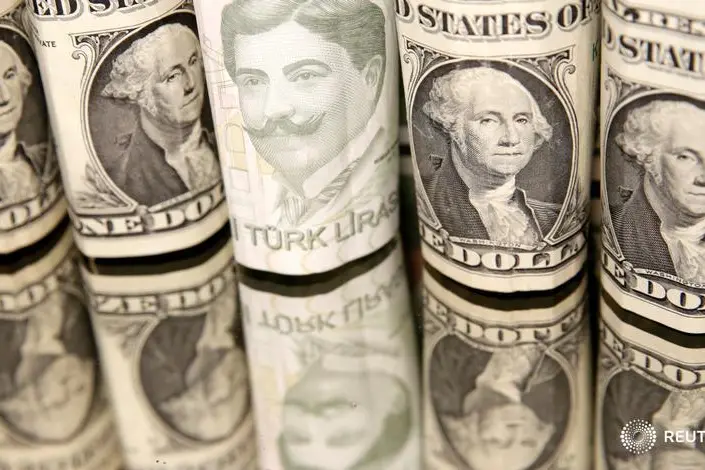PHOTO
The Turkish lira weakened on Wednesday for a 10th straight session towards December's record lows, hit by concerns about an economy burdened by soaring inflation, a widening current account deficit and the policy response.
The lira dipped to 15.95 against the dollar by 0711 GMT, easing 0.3% on the day. It has lost 17% of its value this year, with a 7.5% decline since the latest bout of weakness began on May 5.
The December lira crisis was triggered by a series of unorthodox interest rate cuts and Commerzbank said there was no limit to how much the lira might depreciate, with inflation to continue accelerating as long as monetary policy allows it to.
"There are no 'fair' levels at which this process might end," the bank said in a note.
With the lira now close to the 16 level against the dollar, market participants are questioning the sustainability of what they see as a state-sector managed exchange-rate policy, and economic policies generally.
"Foreigners are not very active in the market. The foreign exchange demand of institutions is very high," said a treasury desk trader at one bank, with forex supply only coming from the state sector and with high forex demand for energy imports.
"The global demand for dollar is also very high, supply chains are problematic. External conditions are not in favour of Turkey," the trader added.
Turkey's 5-year credit default swaps (CDS), the cost of insuring against default, hit a record high of 718 basis points this week, IHS Markit data showed. On Tuesday they ended around 699-709.
Concerns have also surfaced regarding Turkey's objections to Finland and Sweden joining NATO, although both countries have voiced optimism that common ground can be found to overcome the objections.
Bankers generally do not expect a sharp decline in the short term similar to the one in December, which saw the lira plummet to 18.4 against the dollar to end the year down 44%.
But they say there is a "great" risk of further depreciation if there are no new foreign currency inflows in the medium to long term to support the lira.
The currency remained relatively stable in the first months of the year, largely thanks to a government scheme that protects lira deposits against depreciation, as well as the central bank meeting the market's forex needs through its reserves.
The war in Ukraine began to exert pressure on the lira in March as Western sanctions on Russia sent energy prices soaring, pushing up Turkey's already hefty import bill.
(Additioanl reporting and writing by Daren Butler; Editing by Jonathan Spicer)





















